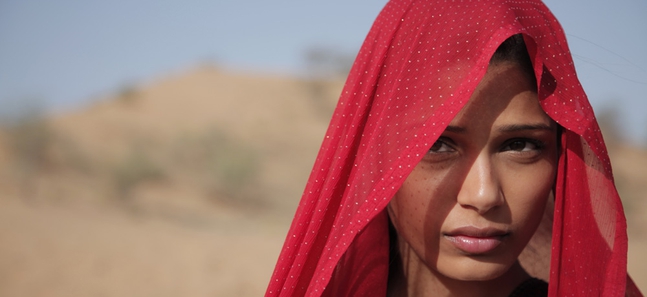Trishna
Thomas Hardy gets an Indian makeover, with ravishing results

Posted: Fri Oct 28 2011
Director: Michael Winterbottom
Starring: Freida Pinto, Riz Ahmed, Roshan Seth
Rating: 
After transposing Thomas Hardy's The Mayor of Casterbridge to gold rush era California in The Claim (2000), Michael Winterbottom attempts an even bolder reinterpretation in his latest adaptation of the author's work. Trishna is loosely based on Tess of the d'Urbevilles, taking Hardy's tale of tragic romance and encroaching modernisation and finding it a new home in present-day Rajasthan. Working with regular cinematographer Marcel Zyskind, Winterbottom captures his locations in such arresting, vibrant detail that they occasionally risk overshadowing the central drama, resulting in a film that's always stunning to look at, though sometimes less involving on an emotional level.
Jay (Riz Ahmed), a wealthy Brit tasked with looking after his father's Indian hotel business, has a chance encounter with a young Rajasthani woman while traveling through the region and is instantly attracted to her – as you would expect with any character played by the preternaturally gorgeous Freida Pinto. Trishna is the oldest child in a deprived household overflowing with youngsters, and when her father loses his all-important jeep to a road accident, she accepts Jay's offer of a well-paid job at one of his hotels in order to support her family. First through coercion and later through her own volition, she becomes romantically involved with this amorous rich kid, but there are social and cultural divides that their love will never be able to overcome.
One of the biggest surprises of Trishna is how well Winterbottom's act of relocation works: without wanting to sound facile, it does for Hardy what Amy Heckerling managed with Jane Austen in Clueless, teasing out unexpected resonances while preserving key incidents from the book in a way that's often quite ingenious. All the same, purists may be aghast at some of the liberties that he's taken, especially the decision to combine Tess/Trishna's two male suitors into one character. While this creates some interesting tensions – not to mention overtones of exoticism – in the central relationship, it also makes the tragic denouement harder to swallow. Pinto and Ahmed are utterly believable when they're falling in love but less so when they're falling out of it, and they never seem to sink quite low enough for the events of the final reel to make sense.
Still, it's ultimately hard not to be won over by Trishna, a film whose ravishing surfaces more than compensate for any wonkiness under the covers. With each new picture, Michael Winterbottom seems to confirm his status as one of the boldest filmmakers around. His latest gamble is no different.
Tweets
- About Us |
- Work for Time Out |
- Send us info |
- Advertising |
- Mobile edition |
- Terms & Conditions |
- Privacy policy |
- Contact Us
Copyright © 2014 Time Out Tokyo














Add your comment